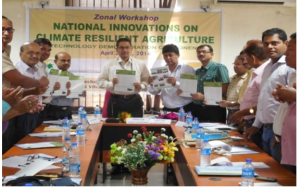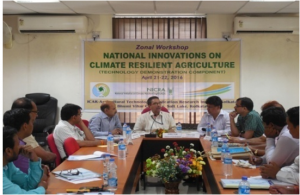Proceedings of Zonal Workshop of National Innovations on Climate Resilient Agriculture (Technology Demonstration Component) held at ICAR-ATARI, Kolkata on April 21-22, 2016
The Zonal workshop of National Innovations on Climate Resilient Agriculture (Technology Demonstration Component) was held at ICAR-ATARI, Kolkata on 21-22nd April, 2015. The workshop was chaired by Dr S. K. Roy, Director, ICAR-ATARI Kolkata on April 21, 2016 and Dr. Ch. Srinivasa Rao, Director ICAR-CRIDA, Hyderabad on April 22, 2016. The workshop was attended by Dr. JNVS Prasad, NICRA-TDC Cooridinator, CRIDA, Hyderabad, Dr. S. C. Sarkar, Director of Extension Education, UBKV, Coochbehar, Dr. B. Shahi, Nodal Officer of KVKs of RAU Pusa, Dr. R. N. Singh, ADEE of BAU, Bihar, all the scientists of the ATARI, Kolkata, and all the Programme Coordinators of NICRA implementing KVKs of Zone II. One publication ‘NICRA Newsletter- Towards Climate Smart Agriculture’ published by of ICAR ATARI Kolkata was released.
The workshop started with welcome address by Dr. F. H. Rahman, Principal Scientist-cum- NICRA Nodal Officer, ICAR-ATARI Kolkata. In his welcome address Dr. Rahman presented the highlights of the salient achievements carried out by the 17 NICRA- KVKs of the zone.
Dr. S. K. Roy, ATARI Director while addressing the inaugural speech he asked all the NICRA-KVKs to prepare case studies/success stories based on the most successful and scalable technologies and those should be replicated in nearby areas. He mentioned that the intervention under NICRA should read vulnerability with existing cropping practices and preventing this vulnerability through NICRA intervention is to be a priority. He emphasized to take up new interventions model which have direct bearing with the climate change.
Dr. Ch. Srinivasa Rao, Director CRIDA, Hyderabad showed his satisfaction on the performances of KVKs’ activities. He mentioned that the KVKs should focus on details of district on climate resilient information and suggested that if any modify is necessary. He also suggested that some of the presentation were excellent and few of them need improvement which should focus only on climate resilient activities. He emphasized that the successful technologies should be transferred from one KVK area to other areas of KVKs. He further mentioned that performance of NICRA activities would be evaluated and as per the report the project may be extended further. He appreciated a lot that KVKs generated a huge fund through convergence programme with other ongoing programmes in the respective district during last four years. He asked every NICRA-KVK to follow website of CRIDA for contingent planning if there will be delayed monsoon, flood, drought occurred and also requested any modification is required for any district they should send their inputs to CRIDA so that necessary changes may be done accordingly.
Dr. JVNS. Prasad, Coordinator, NICRA-TDC, CRIDA, Hyderabad mentioned that each intervention should be planned in relation to the climatic vulnerability like drought, cyclone, salinity, heat stress, flood etc. Overall he showed his satisfaction about the performance of NICRA-KVKs of this zone. He informed that there must be preparedness for handling climatic contingency. He emphasized on the following actionable points:
- Farmers wise and intervention wise data to be provided by every KVK
- There should be scientific data along with good action photograph will be more than previous year
- Intervention should be taken on farmers’ field based on the variability of environmental condition
- Scientific data and good action photograph will be more than previous year
- Data on extent of climatic variability should be provided
- More focusing only NICRA intervention work for all KVKs
- Documentation of the successful intervention
- Need to improve of the performance of CHC and VCRMC
- Timely report on unseasonal rainfall and extreme events
- Well performing NICRA KVKs exchange their knowledge with other NICRA KVKs
- Contingency planning may be prepared to respond in time
- Mention on flooded, drought, upland, midland and lowland area at the village
- Provide information of contingency plan on NICRA villages
Dr. S. C. Sarkar, Director of Extension Education, UBKV, Coochbehar mentioned that the selection of site for NICRA-TDC activities is very important. Soil health cards distribution to the farmers need to be undertaken in NICRA villages. Activities to be undertaken for womenfolk in the NICRA villages. Dr. B. N. Shahi, Nodal Officer of RAU KVKs mentioned that there are two different situations prevailed in Bihar and accordingly activites to be taken for sustainable production. Dr. R. N. Singh, ADEE of BAU, Bihar, emphasized more convergence activities need to be undertaken for replicating the successful technologies. Dr. P. P. Pal, PS of ATARI, Kolkata suggested that Socio-economy impact of NICRA technology to be studied. Dr. S. K. Mondal PS of ATARI, Kolkata requested there must be more intervention to be considered for livestock and fishery in relation to climatic vulnerability.
In the technical session, all the Programme Coordinators of NICRA-KVKs have presented their salient achievements during 2015-16 and the action plan for 2016-17.
Some of the General recommendation came out of the two days workshop are mentioned as:
- Vulnerability index should be measured and accordingly intervention to be executed
- Large scale dissemination of successful technologies to be undertaken
- After saturation of farmers in present NICRA village with technology then those should be replicated in neighbouring villages
- Farmers wise and intervention wise data to be provided by every KVK
- Performance of CHC and VCRMC need to be improved
- Contingency planning may be prepared to respond in time
- Detail of proven technology needs to be documentd
- NICRA activities should not clubbed with KVKs normal activities
- Topography situation of village data (Up, Mid & Low land) should be kept in each NICRA village
- Socio-economic impact of the successful technology demonstration should be analysed
- Intervention on livestock/fishery should be taken on proper climate resilient basis
- One KVK member must be included in the VCRMC Bank account for transaction
- There may be around 20% member from women section in VCRMC Committee
- In absence of SRF two contractual staff as Field Assistant may be engaged on need basis with an honorarium of Rs. 5000-6000 p.m. per staff
- Well performing NICRA KVKs exchange their knowledge with other NICRA KVKs
- Documentation of the successful intervention to be prepared
- Extension activities or training programme to be conducted on climate related issues
- All KVKs should have GPS facility (Approx cost Rs. 8000/-)
- Irrigation potential increasing trend through the construction of dam is to be studied
- All the KVKs should prioritize their required equipments based on the budgetary provision.
- The titles of the training under NICRA should be innovative with thrust on climate resilience.
- For NRM activities Farmers share to be collected @ 10%
- Any intervention under NICRA to be addressed with climate – cattle population to be related with supply of more organic manner which adds to increase in Carbon content of the soil
The workshop ended with vote of thanks proposed by Dr F. H. Rahman



